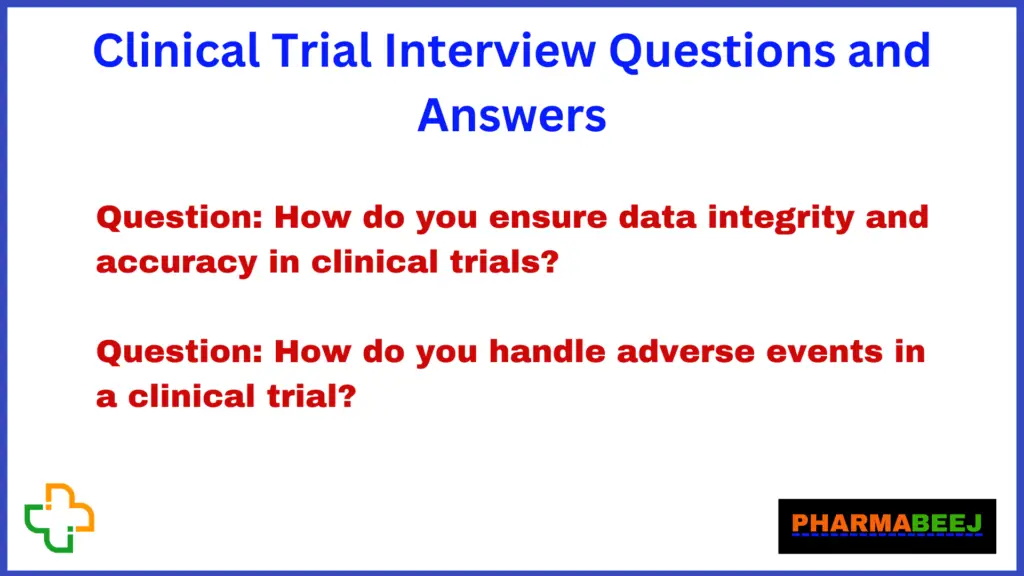Clinical Trial Interview Questions and Answers:
- What experience do you have in clinical trials?
Answer: I have a strong background in conducting clinical trials. I have worked as a clinical research coordinator for three years, managing multiple trials simultaneously. I am familiar with protocol implementation, patient recruitment, informed consent, data collection, and adverse event reporting.
2. How do you ensure patient safety during a clinical trial?
Answer: Patient safety is of utmost importance in clinical trials. I adhere to strict protocols and guidelines to ensure patient safety throughout the trial. This includes regular monitoring of participants, timely reporting and management of adverse events, and ensuring compliance with ethical and regulatory standards.
3. How do you handle challenges in patient recruitment?
Answer: Patient recruitment can be challenging, but I employ various strategies to overcome it. I leverage my network of healthcare professionals, engage with patient advocacy groups, utilize social media platforms, and collaborate with other research sites to expand the participant pool. I also focus on providing clear and comprehensive information to potential participants to address any concerns or misconceptions.
4. How do you ensure data integrity and accuracy in clinical trials?
Answer: Data integrity and accuracy are critical in clinical trials. I strictly follow Good Clinical Practice (GCP) guidelines and maintain meticulous documentation. I implement rigorous quality control measures, including source data verification and double data entry. I also ensure that all data are securely stored and only accessible to authorized personnel.
5. How do you handle adverse events in a clinical trial?
Answer: Adverse events are carefully monitored and managed throughout a clinical trial. I promptly report any adverse events to the appropriate regulatory bodies and the trial sponsor. I also ensure that affected participants receive appropriate medical attention and follow-up care. Additionally, I assess the relationship between adverse events and the investigational product to determine if any protocol modifications or safety measures are necessary.
6. Can you describe your experience with regulatory compliance and ethics in clinical trials?
Answer: I have a thorough understanding of the regulatory and ethical aspects of clinical trials. I am well-versed in the requirements set forth by regulatory authorities such as the FDA and ICH guidelines. I ensure that all trial activities adhere to these standards, including obtaining informed consent, protecting participant confidentiality, and maintaining trial documentation for auditing purposes.
7. How do you manage and coordinate multiple tasks and responsibilities in a clinical trial?
Answer: Managing multiple tasks and responsibilities in a clinical trial requires effective organization and prioritization. I create detailed study plans and timelines to ensure all tasks are accounted for. Additionally, I communicate regularly with the research team to delegate responsibilities and provide clear instructions. By utilizing project management tools and maintaining open lines of communication, I ensure smooth coordination among team members.
8. How do you handle conflicts or disagreements within a research team?
Answer: Conflicts or disagreements can arise within a research team, but it’s important to address them in a professional and collaborative manner. I encourage open and respectful communication, actively listening to all team members’ perspectives. I aim to find common ground and facilitate productive discussions to resolve conflicts. If necessary, I involve higher-level authorities or seek mediation to ensure a harmonious and productive work environment.
9. Can you provide an example of a time when you had to make a difficult decision during a clinical trial? How did you approach it?
Answer: In a clinical trial, difficult decisions may arise, such as determining the continuation or discontinuation of a participant’s involvement. In such situations, I rely on a combination of objective data and ethical considerations. I consult with the research team, medical experts, and the trial sponsor, if needed, to gather different perspectives. Ultimately, I weigh the potential risks and benefits and make a decision that prioritizes participant safety and the integrity of the trial.
10. How do you stay updated with the latest developments and trends in clinical research?
Answer: Staying updated with the latest developments and trends is crucial in clinical research. I regularly attend scientific conferences, workshops, and webinars related to clinical trials. I actively engage with professional networks and subscribe to reputable journals and newsletters. Additionally, I participate in continuing education programs to enhance my knowledge and skills in clinical research.
11. Can you discuss a situation where you encountered an unexpected challenge during a clinical trial and how you resolved it?
Answer: Clinical trials often present unexpected challenges. For instance, encountering a sudden drop in patient enrollment. In such cases, I assess the reasons behind the decline, collaborate with the recruitment team to identify alternative recruitment strategies, and proactively engage with referring healthcare professionals to increase referrals. Additionally, I may modify the eligibility criteria or explore new recruitment sites to address the challenge and ensure the trial progresses as planned.

Also Read:
- Clinical Data Management Interview Questions And Answers
- Karl Fischer Titration Interview Question and Answer
- Dissolution calibration in pharma
- How to do UV Calibration As Per USP In Pharma?
- How to prepare 0.1N HCl in pharma?
- Preparation and standardization of 1N NaOH as per USP
- What is clinical trial in pharma?
- What is Phase 0 clinical trial in pharma?
- What is Phase 1 clinical trial in pharma?
- The practices with data integrity risk (DI Risk)
Refer YT Channel: Pharmabeejpro